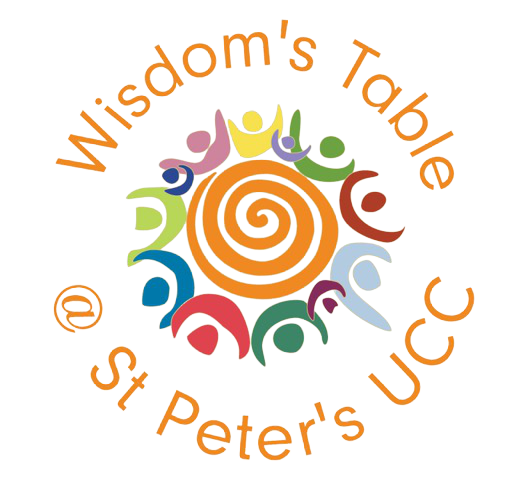At Wisdom’s Table, our theology is progressive but deeply rooted in the traditions of Christianity. We believe “traditional” and “progressive” actually go well together when it comes to “being church.” We are at once deeply rooted in the patterns and forms of Christianity that have supported the church throughout the millennia, and at the same time we are open to fresh winds of the Spirit that inspire us to embody those patterns and forms in new ways. Our worship embodies this kind of “traditional/progressive” perspective. Here’s what we mean by that:
First, let’s take on “traditional.” Our worship is patterned after the ancient service of worship (called “liturgy”) that has been with the Christian church from pretty much the beginning.
This liturgy is centered in the Western “Church Calendar.” The Church Calendar keeps time each year based upon that the birth, life, death and resurrection of Jesus and the coming of the Spirit. It’s a helpful antidote to keeping time according to workdays, weekends, deadlines and dollars! Worshiping with this calendar helps to keep us on track in our spiritual lives.
The traditional liturgy is structured in four parts: Gathering (during which time we do things like remind ourselves that we are loved by God, confess that we sin and need God’s grace, and sing a song of two of praise), Word (which includes reading from scripture, a sung or responsively-spoken Psalm, a sermon, and prayers of the people), Table (when we share our offerings, gather the gifts of the earth and come to the Table to commune with Christ and each other) and Sending (when we are blessed to go forth and serve God in the world.. and sing a song or two!)
Central to our “traditional” form of worship is an invitation to the Table. You can call it the Lord’s Supper, Holy Communion, Eucharist or “Breaking Bread with J.C.” – but the point is that it’s the place where everyone who hungers is welcomed into the presence of Christ, where there is enough for everyone, and where we get a taste of the equality and love God intends for the world. We believe it is central to the life of the church and gather at the table (almost) every week.
In observing the traditional pattern of worship oriented around the Christian calendar, we connect ourselves with ways of keeping faith that stretch back for millennia.
But we’re also “progressive!” Though we are very much devoted to the traditional pattern of Christian worship, we also know that some ways of expressing that tradition are stuffy and even hurtful. We try hard to avoid or transform those elements. Here are some of the ways we do that:
- In addition to “traditional” Christian language, we regularly use new and unusual imagery, poetic language and provocative metaphors for God that expand our theological imaginations.
- We often include innovate artistic elements in our worship experience. We employ the visual arts to engage all of our senses (not just our minds and voices) in the worship of God.
- We sing a wide diversity of music at Wisdom’s Table, and we are always seeking to expand our musical diversity even wider. We don’t believe that a song needs to be found in a hymnal to be used in worship. Though we do sing a lot of traditional Christian hymns and spirituals from all kinds of denominations, it’s also common to find “secular” songs woven into our worship. We believe any music that helps shape our imaginations around the Reign (or Kingdom) of God – from Charles Wesley to Bob Marley – is appropriate to Christian worship.
- In the midst of our highly structured services, we regularly have opportunities for spontaneity, such as times for open prayer – when members of the assembly can voice aloud the concerns and joys we bring. And we also encourage all forms of worship expression on the part of individual worshipers. It is common to hear folks “calling back” or raising their hands and voices to express their praise. Allowing for spontaneity and encouraging individual forms of expression allow us to be open to fresh movements of the Spirit in our lives and in our community
Many people have been excluded from the church – because of our sexual orientation, our race, or our marital status. Others have been wounded or cast out by churches that have not made room for their theological perspectives or questions. Wisdom’s Table seeks to be a place of healing, spiritual authenticity, inclusivity and theological exploration. We believe that the core values of Christianity are love and justice, forgiveness and reconciliation, right-relationship and mutual empowerment. Our traditional/progressive worship is structured to teach, affirm, and enact these values.
